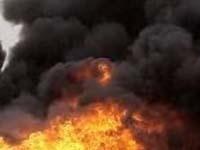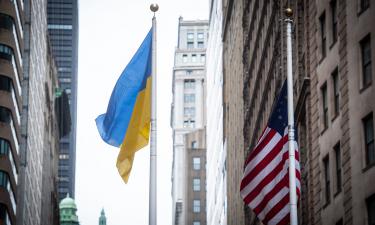Car bomb murders more than 20 in Baghdad, four dead in mortar attacks
Violence raged unabated in Iraq Tuesday as bomb attacks ripped Baghdad , killing at least 26 civilians, and four people died when mortar rounds slammed into their homes in the capital and a nearby town.

A spokesman for a powerful Sunni clerical Association of Muslim Scholars, meanwhile, blasted the government for failing to stanch the deadly attacks that have pushed the country toward civil war.
"It is clear that the government and its security forces are incapable of taking any action," said Abdul-Salam al-Kubaisi, a spokesman for the group. Government forces, he said, should "do their duty and withdraw to the Green Zone," the secure region in central Baghdad that houses the U.S. Embassy.
Al-Kubaisi denied Sunnis were behind recent attacks, declaring that Shiite politicians and religious leaders were trying to inflame sectarian hatred "to make use of these events and everything in this country to achieve one goal to serve their future interests."
Wednesday's most dramatic attack a car bomb near a traffic police office and market in a primarily Shiite neighborhood in southeast Baghdad killed at least 23 people and wounded about 40, according to police Lt. Thaer Mahmoud.
About an hour earlier, a bomb hidden under a car detonated as a police patrol was passing near downtown Tahrir Square , said Interior Ministry Maj. Falah al-Mohammedawi. Police were unharmed but three civilians died and 15 were injured.
In the eastern suburb Kamaliyah, residents alerted police to a suspicious vehicle, which exploded as police cleared the area, causing damage to nearby shops and houses but no casualties, said Interior Ministry Maj. Falah al-Mohammedawi.
Also Wednesday, mortar shells fell on three houses in the mixed Sunni-Shiite town of Mahmoudiya , 30 kilometers (20 miles) south of Baghdad , killing three civilians, said police Capt. Rashid al-Samaraie. A fifth mortar shell slammed into the mixed Qadisiyah neighborhood in west Baghdad , killing a woman and wounding a child, Mahmoud said.
The latest blasts occurred one day after Sunnis and Shiites in Baghdad traded bombings and mortar fire against mainly religious targets, killing at least 68 people following an end to curfews and vehicle restrictions that had briefly calmed a series of sectarian reprisal attacks.
At least six of Tuesday's attacks hit clearly religious targets, concluding with a car bombing after sundown at the Shiite Abdel Hadi Chalabi mosque in the Hurriyah neighborhood that killed 23 and wounded 55. A separate suicide bombing killed 23 people at an east Baghdad gas station, where people had lined up to buy kerosine.
In addition to those known to have been killed Tuesday, police found nine more bullet-riddled bodies, including a Sunni Muslim tribal sheik, off a road southeast of Baghdad . It was unclear when they died.
The surge of violence deepened the trauma of residents already shaken by fears the country was teetering on the brink of sectarian civil war, threatened talks among Iraqi politicians struggling to form a government and raised questions about U.S. plans to begin drawing down troop strength this summer.
Iraq began to tilt seriously toward outright civil war after the Feb. 22 bombing of the important Shiite Askariya shrine in the mainly Sunni city of Samarra , 60 miles (96 kilometers) north of Baghdad .
The U.S. military appeared to have prevented the Tuesday death toll from climbing even higher when soldiers of the 4th Infantry Division conducted a controlled explosion of a bomb placed near a mosque in Baghdad 's Saydiyah neighborhood. There was slight damage to the mosque, the military said, adding that civil affairs teams would help with repairs.
U.S. President George W. Bush decried the latest surge in sectarian violence Tuesday and said that for Iraqis "the choice is chaos or unity."
In congressional testimony, National Intelligence Director John Negroponte said a civil war in Iraq could lead to a broader conflict in the Middle East , pitting the region's Sunni and Shiite powers against one another.
Defense Intelligence Agency chief Lt. Gen. Michael Maples said the sectarian violence stems from a core of Sunni Arab insurgents who can exploit "social, economic, historical and religious grievances."
"Networks based on these relationships remain the greatest threat to long-term stability in Iraq ," Maples said.
The sectarian violence has hit Baghdad hardest because the population in the capital is about evenly divided between Shiites and Sunnis, more so than in any other region of the country.
At about the same time as the attack on the Shiite Abdel Hadi Chalabi mosque, a mortar round landed near the Shiite Imam Kadhim shrine in the Kazimiyah neighborhood on the opposite side of the Tigris River , killing one and wounding 10.
Those attacks appeared to have been in retaliation for assaults on Sunni places of worship earlier in the day.
North of Baghdad, a blast badly damaged a Sunni mosque where the father of Saddam Hussein was buried in the family's ancestral hometown, Tikrit. The Iraqi Islamic Party reported a bomb hit the Sunni Thou Nitaqain mosque in the Hurriyah neighborhood at 8 a.m. Tuesday, killing three and wounding 11. Gunmen in two speeding cars opened fire on the Sunni al-Salam mosque in the western Baghdad 's Mansour district, killing a guard.
Late Tuesday police reported finding the body of Shiite cleric Hani Hadi handcuffed, blindfolded and shot in the head near a Sunni mosque in Baghdad 's notorious Dora neighborhood.
One of the day's bloodiest attacks came when a suicide bomber detonated an explosives vest packed with ball bearings among people lined up to buy kerosine at a crowded filling station in east Baghdad. The blast killed 23 people and wounded 51, leaving behind the charred and twisted remains of wheeled carts that customers had used to transport fuel canisters to the station.
A car bombing in the same neighborhood targeted a police patrol and killed five people and wounded 17 all civilians.
Another car bomb hit a small market opposite the Shiite Timimi mosque in the mostly Shiite Karradah neighborhood, killing six people and wounding 16.
Separately and in an unusual move, the government issued a statement declaring that 379 people had been killed and 458 wounded as of 4 p.m. Tuesday in the sectarian violence tied to the Askariya bombing.
The Washington Post reported Tuesday that more than 1,300 people were killed in the reprisal attacks. The Cabinet statement, however, said "what was reported in a foreign newspaper were inaccurate and exaggerated numbers of victims", reports the AP.
D.M.
Subscribe to Pravda.Ru Telegram channel, Facebook, RSS!




